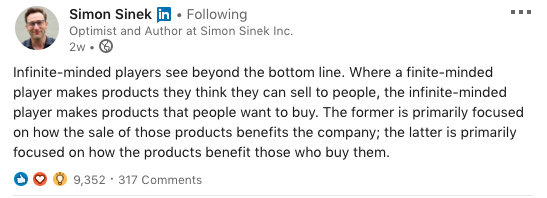
With a net worth of $78.5 billion, Mukesh Ambani added himself to the list of the twenty-five richest billionaires in the world. In the last three months alone, these magnates gained nearly $255 billion.
What particularly stands out is that he got added to this list when the entire market looked bleak. Reliance Industries didn’t just consolidate its position, it strengthened it.
What traits does the elder Ambani share with the other wealthy members on the list? How do the wealthy keep growing their money? From my years of experience in investing and consulting, I’ve noticed that such wealthy people are primarily entrepreneurs who do four things differently from the rest.
1. They Focus on Serving Humanity
“Entrepreneurs clearly envision the future and become so enamored with it that they turn their thoughts into reality and will the future they desire into existence.” – Dr. Peter Diamandis
Visualize two circles. One is what people need and the other is what you offer. Value is their intersection. The larger the intersection, the more value gets created.
Entrepreneurs who make long-term wealth don’t focus on making quick bucks. They follow a higher purpose to serve humanity. YouTube opened the floodgates for people to share information across the world. Facebook enabled people to transcend geographies and connect with others. Reliance Jio democratized internet data by making it available across India.
Thus, the larger the community a business serves, the larger its opportunity to create value. And tangible value brings wealth for its stakeholders. Thus, wealth creation begins with a mindset to serve and empower people.
2. They Print Money
A powerful yet underrated means for businesses to raise capital is to issue shares. There’s no limit to the number of shares a company can issue. Each issuance just reduces the promoter’s stake in the firm.
Facebook’s $5.7 billion investment, private equity giant KKR’s $1.5 billion, and Silver Lake’s $750 million investment were purchases of shares in Reliance Industries. Each stake sale diluted Mukesh Ambani’s ownership. But it also increased his wealth since the company’s valuation skyrocketed.
It’s like reducing your ownership in a company from 100% to 40% while the valuation soars from $1 million to $100 million. A 40% stake in a $100 million company makes you wealthier than a 100% stake in a $1 million company.
3. They Leverage Equity
Equity is a valuable asset for a business when it wants to borrow funds from banks or Non-Banking Financial Institutions (NBFCs) in order to expand or diversify.
For instance, if the owner of a retail business sees an opportunity in another city, he can leverage the equity he raises from relations and investors to borrow from a bank. He uses all these funds to generate long-term returns on capital higher than the Weighted Average Cost of Capital. If the retail owner doesn’t foresee this possibility, he won’t foray into expansion.
But astute promoters also know where to draw the line while leveraging equity. This is because leverage is essentially debt, which can either accelerate growth or kill the business.
The proof is in the contrasting conditions of the companies of the Ambani brothers. Mukesh Ambani’s $150 billion Reliance Industries is debt-free while his brother’s Reliance Communications went under because it drowned in debt.
4. They Build Systems and Processes
“I can buy anything I want basically, but I can’t buy time. There’s no way I’ll be able to buy more time.” — Warren Buffett
Most small business owners wear multiple hats. They try to perform many roles themselves to save costs. But in the process, they lose out on opportunities to create wealth.
To generate wealth, owners can do one of two things. They can either dedicate more time (which is impossible beyond a point), or they can pay competent people to do jobs that free their time and let them focus on bigger things.
Wealthy entrepreneurs choose the latter. They consider time as their most valuable asset. In his book Built to Last, author Jim Collins explains why.
Individual service providers are ‘Time Tellers,’ while those who leverage people’s competence and build systems and processes are ‘Clock Builders.’ “Having a great idea or being a charismatic visionary leader is ‘time telling’; building a company that can prosper far beyond the presence of any single leader and through multiple product life cycles is ‘clock building,’” he wrote.
Most promoters act like Time Tellers. But wealthy people are Clock Builders: their primary output is not to implement a great idea, gratify their egos, or accumulate personal wealth. It’s to hire good people and build systems and processes which, in turn, contribute to creating scalable value for humanity.
Summing Up
Entrepreneurs who create wealth focus on the 3 C’s – Customers, Capital, and Competence. Their focus on customers helps them serve humanity. Capital in the form of equity and debt helps them build competence in the form of systems and processes to empower their people to achieve the goals they’re hired for.
(Main image: Unsplash)

Thanks Manish,
You summarized very crisp to understand difference….
But my question is why only 4% people get results while knowledge is rooming around for all….. nothing hide or secrets left behind now a days….all are available so easily…can we form SOP for all to deliver their optimum, utilise their resources 100%, each and every can get success, not motivate more in future bt telling other stories instead creat their own story….
I just write here openly and friendly…
Thank again…
Dear Sandesh, Thanks. I think, it is not just knowledge but application of knowledge that creates value. Indeed, there are no secret formulae for success. However, application of those formulae demands determination, dedication and discipline. If we follow simple principles of success with commitment, success is bound to stand with us.
Thanks.
Manish
Custom hang tags that dress up your clothing, pricing, events, holidays, and more. One hang tag that does it all comes with 3 unique materials.